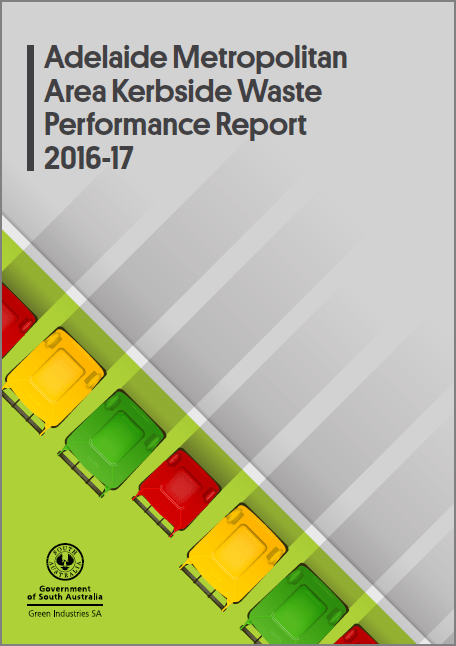
- Waste and recycling
Adelaide Metro Kerbside Waste Performance Report 2016-17
This report presents data on kerbside waste and recycling collection services provided by the 19 Adelaide metropolitan councils in the 2016-17 financial year and analyses performance and improvements in waste disposal efficiency and sustainability over the past 14 years. The focus is only on waste collected at kerbside in bins provided specifically for residual waste (garbage), co-mingled recyclables and green organics. Hard waste, street sweepings, Container Deposit Scheme (CDS) returns and waste collected at drop-off facilities and council-operated commercial services are excluded. All 19 metropolitan councils have offered a three-bin service for a number of years, although some only provide a green organics bin on an opt-in basis.
There are also some differences between councils in terms of protocols. In 2016-17: Approximately 530,300 tonnes of Municipal Solid Waste (MSW) was collected from kerbsides across the 19 council areas. This equates to about 411 kilograms per person or 974 kilograms per serviced household. Of this, 264,800 tonnes were recovered as organics (58.8%) or recyclables (41.2%). This represents a total recovery rate of 49.9%. Between 2002-03 and 2016-17: Total kerbside waste collections increased by 17%. The amount of waste going to landfill fell by 13% (33,800 tonnes) Organics and recyclables collected grew by 57% and 34% respectively. The overall collection recovery rate increased from 31.6% in 2003-04 to 47.8% in 2013-14 then plateaued somewhat. The 2016-17 rate of 49.9% is below the South Australia’s Waste Strategy (GISA 2015) target of 60% waste diversion from high performing bin systems by 2020, making it clear that there is still work to be done.
Analysis shows that the top performing councils in 2016-17 – some achieving nearly 60% recovery rates – were those that provide a weekly residual waste collection, fortnightly recyclables collection and fortnightly organics collection that includes food waste. Some groupings of councils have recovery rates seven to 10 percentage points lower than others due to their use of opt-in system for organics collections. It should be noted that South Australia’s Waste Strategy 2015-20 has an MSW diversion rate of 70%, which includes kerbside bins, hard waste, resident drop, CDS, etc.
The findings of this report suggest that the following changes are necessary to improve the diversion of waste from landfill: Adopting a standardised three-bin system across all metropolitan councils to include as a minimum service to all households: a. fortnightly collection of co-mingled recyclables b. fortnightly collection of organics, including food waste.




